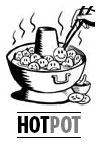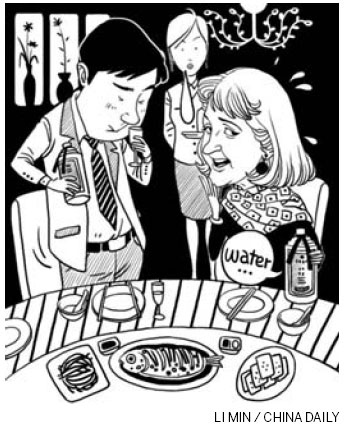Life and Leisure
Experiencing the tangible cultural heritage of drinking
By Lisa Carducci (China Daily)
Updated: 2010-12-21 08:06
 |
Large Medium Small |
When I came to China in 1990, I had to give up my daily glass of wine with dinner. Italians in Canada used to make their own wine for the year.
I later found a Chinese dry red wine called "gan hong", but the content was grape juice, mixed with alcohol and sugar. The Chinese I was acquainted with who knew what "real" wine tasted like would add sugar or lemonade as they considered it too sour.
Today, Chinese are used to good quality wines from all over the world, and domestic brands have improved, too. But the drinking culture still amazes me.
Drinking here is a public act with rich social meaning.

When foreign guests are invited to a banquet, a measure of red wine in a glass is usually presented, but it must not be touched before the MC proposes a toast.
Tea is not meant to wash down a meal. Rather, waiters ask guests what they would prefer: coke, fruit juice or some other soft drink is usually offered to women, while beer is offered to men.
I soon realized the wisdom of having something else to drink but alcohol because you should drink the wine or spirit at the invitation of another guest who proposes a toast. If you take your glass first, your companions will immediately take up theirs, ready to drink after you propose a toast.
The hard core of Chinese drinking culture is baijiu, liquor with a high alcohol content, which the Chinese believe only they are strong enough to imbibe. They are always surprised when foreigners, especially women, can drink a lot of it.
In 1995, a Chinese magazine invited four Western writers and me to visit Shandong province. For health reasons, the two men could not drink alcohol, and the Northern European woman had never drunk a drop before.
At the welcoming banquet, our table was separate from our hosts, which gave me the opportunity to tell the three non-drinkers that they could secretly empty their glasses in a little bowl after each "fake" toast.
The American woman, who had just come to China, liked the taste of baijiu a lot and asked for more. I warned her that each of our six hosts would come to our table to propose a toast, and we must show our gratitude and respect with a "gan bei" (bottoms-up). This is why tiny glasses are used for baijiu.
But she didn't take my advice, accepted all the toasts and more, and went to bed. The next day we left on a tour without her, as she couldn't get up.
Chinese attach great importance to drinking. During a lunch with the mayor on the trip to Shandong, I was seated to his right. I felt it was my responsibility to "save face" for Westerners. To save face, some Chinese even risk their health to down every cup of liquor at a banquet.
But I did something wrong, though I thought it was very clever at first: I filled an empty bottle of baijiu with water and grabbed each chance to refill my glass before the mayor could but never filled his glass. This was really strange for those present, who regard filling a guest's glass with liquor an expression of respect.
After a dozen toasts, the mayor said, between gritted teeth, something along the lines of: "That woman is too strong." He grabbed my bottle, smelled it and ordered the waitress to bring a "genuine" one.
Mea culpa, I had cheated. When the banquet finally ended, my two male colleagues had to support me on either side as I was walking on clouds, under a whirling ceiling.
China Daily
